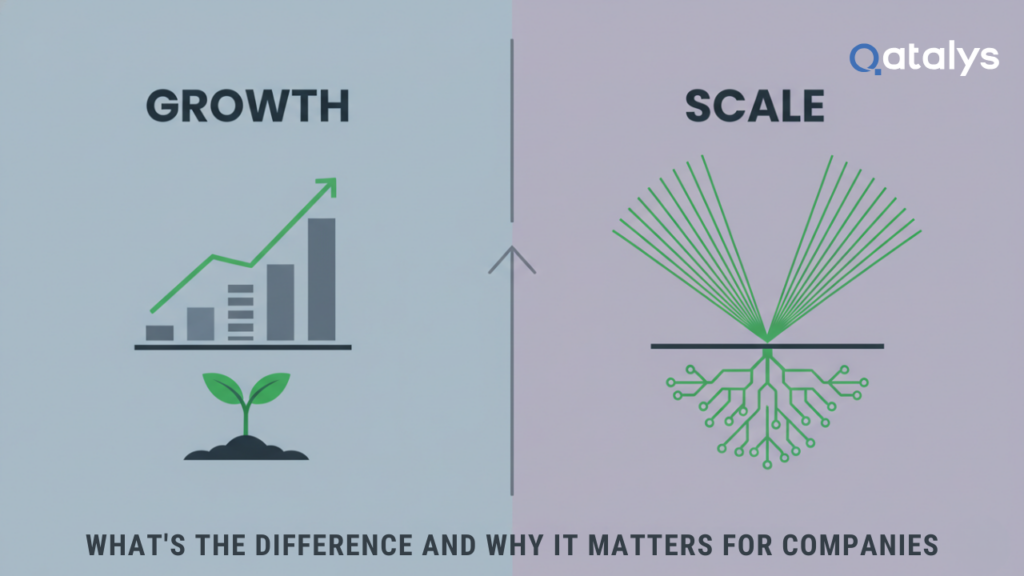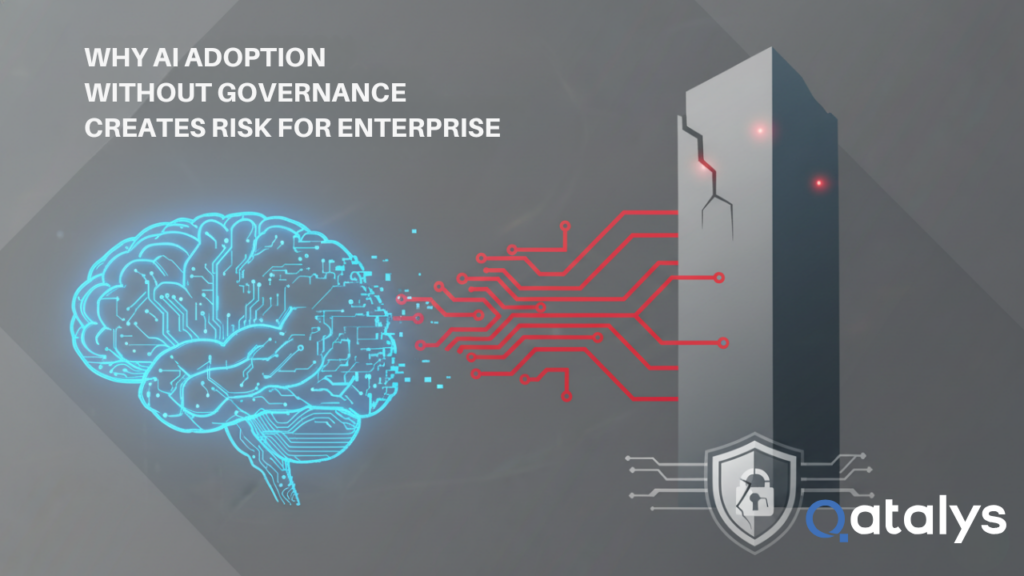Clearing the Fog Around Venture Studio Partnerships
Venture studios are gaining traction – but for many founders, they’re still a bit of a mystery.
Are they like accelerators? Do they take over your startup? What do they actually offer beyond funding? If you’ve found yourself asking these questions, you’re not alone.
Unlike traditional VCs or incubators, venture studios are hands-on partners – helping build startups from the ground up, often with shared teams, capital, and infrastructure. But the model isn’t one-size-fits-all, and the details can make or break your experience.
That’s why we’ve compiled this no-fluff FAQ to answer the 10 most common questions founders have before partnering with a venture studio.
Whether you’re exploring your first venture or looking for a smarter way to build, these answers will help you move forward with clarity and confidence.
1. What is a venture studio, and how is it different from an accelerator or VC?
A venture studio like Qatalys is a company that builds startups internally or in close collaboration with founders. Unlike accelerators or VCs, which fund existing startups, studios are involved from the ideation or early validation stage – often co-creating the business.
Key differences:
- VCs provide capital and strategic advice – but don’t build.
- Accelerators offer short-term programs, small funding, and mentorship.
- Studios provide deep operational support (product, tech, hiring, GTM) and co-own the company.
The venture studio model reduces founder risk by supplying pre-built infrastructure, expert teams, and startup playbooks. It’s not about just writing checks – it’s about rolling up sleeves to build and scale with you.
2. Who is a venture studio best suited for?
Venture studios are ideal for founders who want to move fast without reinventing the wheel. This includes:
- Domain experts with startup ideas but no technical/product team
- Solo founders needing operational support and early traction
- Repeat founders who want to de-risk execution
It’s also a strong fit for:
- Startups solving complex B2B or enterprise problems
- Founders who value strategic partnership over complete independence
- Seed-stage ventures struggling with product-market fit or team gaps
However, if you already have a strong team, traction, and prefer full autonomy, a VC or accelerator might be more appropriate. Studios are for those who want hands-on collaboration, not just capital.
3. Do I need an idea to partner with a venture studio?
Not always. Many studios have in-house ideas they’re actively developing and looking for the right founder to lead.
There are generally three types of entry points:
- Idea-stage founders – You bring the concept, the studio co-builds it with you.
- No-idea founders – You bring your expertise, and the studio matches you with a problem or validated idea.
- Early-stage startups – You’ve started but need help building or scaling.
What matters most is your founder-market fit – your experience, mindset, and ability to lead. If you’re execution-ready but lack a fully formed business model or MVP, studios can fill the gap.
4. What does a typical partnership structure look like? (Equity, support, involvement)
Most venture studio partnerships involve shared equity in exchange for capital, talent, and resources.
Typical structure:
- Equity split: Studios may take 20%–50% depending on stage, team, and how much they’re contributing (funding, tech, GTM, etc.).
- Support provided: Product development, UI/UX, engineering, fundraising, recruitment, back office ops.
- Capital: Some studios invest upfront, others help raise funds once MVP is ready.
- Duration: Ongoing – not a 3-month bootcamp. Studios stay involved through early scaling stages.
Always clarify: IP ownership, founder vesting, roles, and exit expectations. The best studios are transparent and operate like true co-founders – not just service providers or passive investors.
5. Will I lose control of my startup if I partner with a venture studio?
No – but you will be sharing ownership and decision-making.
Studios typically operate as co-founders or strategic partners, not full controllers. They bring in resources and structure that increase your odds of success, but it’s still your vision to lead.
That said, it’s important to:
- Clearly define roles and responsibilities early
- Align on long-term vision, funding plans, and exit goals
- Negotiate fair equity that reflects each party’s contribution
If a studio demands majority control without transparency, that’s a red flag. The best partnerships are collaborative – empowering founders while backing them with deep operational muscle.
6. How involved is the venture studio in day-to-day operations?
In the early stages, studios are very hands-on. Expect support with:
- Product management
- UI/UX and dev resources
- Marketing & GTM
- Hiring and investor outreach
As the startup matures, studio involvement typically shifts from daily execution to strategic support – advising on key decisions, funding rounds, and hiring leadership.
Think of it as a phased model:
- Phase 1: Build and launch with studio’s internal team
- Phase 2: Co-run the startup with shared roles
- Phase 3: Gradual transition toward founder-led independence
You’re not outsourcing your startup – you’re building it with a high-leverage partner until you’re ready to fully take over.
7. What kind of support do venture studios actually provide?
Studios offer full-stack startup support, often including:
- Tech: CTO-level guidance, dev teams, product roadmaps
- Design: UI/UX, branding, MVP prototyping
- Growth: GTM strategy, marketing ops, CRM setup
- Fundraising: Pitch deck help, investor intros, round planning
- Hiring: Access to pre-vetted talent pools and recruitment help
- Legal & Finance: Incorporation, cap table management, contracts, bookkeeping
This allows founders to move from idea to MVP to first revenue much faster – without needing to stitch together a dozen freelancers or agencies. Studios work like a startup-building machine, with shared infrastructure already in place.
8. How do I know if a venture studio is the right fit for me?
Ask yourself:
- Do I want a partner who’s involved, not just investing?
- Do I need help building a product, team, or GTM plan?
- Am I open to collaboration and equity-sharing for execution speed?
Also evaluate the studio’s:
- Track record: What have they built or exited before?
- Focus: Do they work in your industry or model (SaaS, consumer, DTC)?
- Support structure: Is there a real internal team, or is it mostly outsourced?
- Founder-first culture: Do they treat you as the driver or just an operator?
If you’re looking for execution leverage, aligned incentives, and a deep startup playbook – a studio may be your best bet.
9. What do successful venture studio-backed startups look like? Any examples?
Many well-known startups have come out of venture studios, including:
- Snowflake – incubated by Sutter Hill Ventures
- Giphy – born out of Betaworks
- Cameo – started at Chicago-based studio
- Oura Ring – supported by a Nordic studio model
- Aircall – built with the help of eFounders
While models vary, the common thread is execution speed + deep support. These companies reached product-market fit and scaled faster than most traditional startups because they didn’t have to build everything from scratch.
Look at the studio’s past ventures – their success rate, how involved they were, and how many companies went beyond Series A or reached exits.
10. What should I ask before signing with a venture studio?
Due diligence goes both ways. Before partnering, ask:
- What’s your typical equity structure and engagement model?
- What support do you provide in-house vs. outsourced?
- Can I meet founders you’ve previously worked with?
- How do you handle IP, decision rights, and conflict resolution?
- What happens if we want to pivot, raise, or exit?
Also clarify:
- Who will be your point of contact?
- What are the expectations on your time, role, and responsibilities?
- What’s the long-term vision for the partnership?
A good studio will welcome tough questions – and answer them with clarity, not vagueness.
Choose the Right Partner, Not Just Capital
Venture studios aren’t for every founder – but for the right ones, they offer a powerful path to build smarter, faster, and with fewer early-stage risks.
The key is clarity. Knowing what studios bring, how they operate, and what they expect helps you approach the relationship as a true strategic partnership, not just a shortcut.
If you’re execution-ready but resource-constrained – or if you’re looking for deep operational support alongside funding – a venture studio may be exactly what you need.
Still exploring?
Book a Discovery Call with Our Studio Team – ask us anything before you decide
The best founders ask better questions. Now you’ve got the answers – make them work for you.








